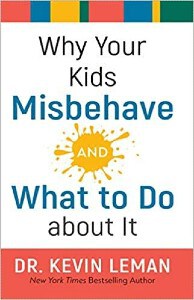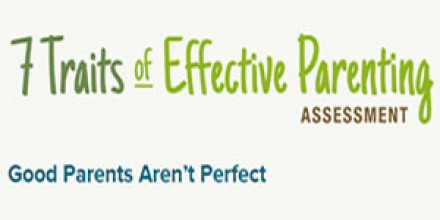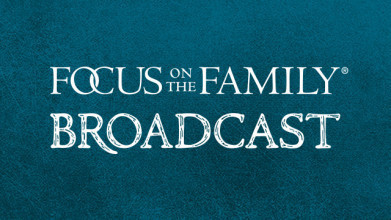
Homemade Meals for Busy Families
Mary Beth Lagerborg, co-creator of Once-A-Month-Cooking, discusses the importance of hospitality and how families can prioritize dinner time by cooking a month’s worth of healthy meals in one session.
Home » Episodes » Focus on the Family Broadcast » Understanding the Root of Your Child’s Misbehavior (Part 1 of 2)
Preview:
Dr. Kevin Leman: The words are a little different, but they all convey sort of the same thing. That you always had my back, you always loved me as I was. You know, you didn’t compare me to my sister or my brother, and they… I think each kid always felt like they were the favorite. And so, parents, listen to what I’m saying. Your words make a difference.
End of Preview
John Fuller: Welcome to another best of 2021 episode of Focus on the Family. We’re gonna help you get to the bottom of why your child misbehaves. Your host is Focus president and author Jim Daly, and I’m John Fuller.
Jim Daly: John, we have the privilege of speaking with many parenting experts every year, but I especially love conversations with advice you can start applying today. Uh, it doesn’t take a degree. We received some wonderful feedback on this program from parents who felt like they were at the end of their rope-
John: Mm-hmm.
Jim: … and needed practical help. And I can remember times when my boys were young, and it felt like Jean, and I were stuck in a frustrating cycle. And no matter how many times we reminded them, “Say please. Say thank you.” You remember that?
John: Mm-hmm.
Jim: Uh, it just seemed to not stick. And if this is your situation, stay tuned. We’ll have commonsense advice to help you train your children to become responsible adults.
John: And Jim, if I may, just a personal observation, your boys have become responsible adults-
Jim: (laughs)
John: … who say “Yes, ma’am,” and “Yes, sir,” so-
Jim: They’re moving in the right direction.
John: Yeah. Yeah, well, uh, as I mentioned, we’re revisiting a conversation that we had with Dr. Kevin Leman. Uh, Jim, your wife, Jean, joined us as well. We should mention, this conversation was based on Dr. Leman’s terrific book, Why Your Kids Misbehave and What to Do About It. Let’s go ahead and revisit this Best of 2021 episode on today’s Focus on the Family.
Jim: John, we also have a little studio audience with us, some Focus staff people. Let’s say hi everybody.
Audience: Hi.
Jim: (laughs) And, uh, we’re gonna have a little Q&A at the end here.
John: We will.
Jim: And, uh, so be thinking of your questions as we move along. Um, also, you said Jean is here. Jean, it’s great to have you here as always. Dr. Kevin Leman, great to have you both. Thanks for being with us.
Dr. Leman: Oh yes, we’re a winning combination.
Jean Daly: (laughs)
John: Well, I know that. You guys, I’m a little concerned actually.
Jean: (laughs)
Jim: Well, last time we were together, we talked about marriage.
Jim: I know.
Dr. Leman: Right.
Jean: Yes.
Jim: And it’s really helped-
Jean: Yep.
Jim: … and in Jean and I’s relationship.
Jean: Yeah.
Jim: Thank you very much.
Dr. Leman: Yeah, she called me.
Jim: (laughs)
Audience: (laughs)
Jim: There has been time… There have been times when I’ve come home and said, “You know, Jean, I think we need to spend 15 minutes and let the kids go play.” And she’ll say, “Who- who did you interview with today?”
Dr. Leman: (laughs)
Jean: That’s true.
Jim: That is true. And so, I can say-
Dr. Leman: (laughs)
Jim: … well, Dr. Kevin Leman had that great idea.
Dr. Leman: Yeah.
Jim: But you’ve worked with lots of families, Kevin, and, uh, you have noticed the ways kids work their parents. Now, I’ve never experienced that. Have you, John?
John: Oh, golly.
Jim: (laughs) So speak to that issue about how kids work their parents. And I think you had a specific example about being in a restaurant and seeing a little-
Dr. Leman: Oh, yeah.
Jim: … a little one work her parents.
Dr. Leman: Oh, my goodness. Yeah. I’ve often said, we’ve seen the enemy, and they are small.
Jean: (laughs)
Audience: (laughs)
Dr. Leman: And they’re unionized little suckers.
Audience: (laughs)
Dr. Leman: And they have a game plan, and we were at, uh, one of those commercial steakhouses. And in Tucson, where I live most of the year. And a young family came in. It was mom, dad, maybe 12, 13-month-old little child, grandma, grandpa, and maybe an aunt. And they were in one of those round booths, but right next to us.
Jim: (laughs)
Dr. Leman: (laughs) I’m an observer of people. Let’s put it that way. And I just thought to myself, “Oh, this gonna be interesting.” Because they brought over one of those little wooden highchairs.
Jim: Right.
Dr. Leman: In fact, you’ve seen people maybe turn ’em upside in a restaurant, and they’ll put a- a car seat-
John: Car seat in ’em, yeah.
Jean: Yes.
Dr. Leman: And the dad tried to put the little cherub-
Jim: (laughs)
Jean: (laughs)
Dr. Leman: … into the seat. And instinctively, the little cherub pulled up her legs.
Jim: (laughs)
Dr. Leman: Okay.
Jim: Gonna make this hard.
Jean: Sure.
Dr. Leman: And that’s when I said, “I’m gonna pay attention because I know how this is gonna play out.”
Jim: (laughs)
Jean: (laughs)
Dr. Leman: And God bless ’em, they tried to get that little ankle biter in there, but she-
Jean: (laughs)
Dr. Leman: … had no part of it.
Jim: (laughs)
Jean: (laughs)
Dr. Leman: So, what do you do? Dad goes and brings her and puts him on the seat. And I knew that child would be passed around, which happened during the meal. Came back to dad. Dad was trying to feed the baby. The baby took a spoonful offering and threw it over the shoulder. I mean, it was just hysterical-
Jean: (laughs)
Dr. Leman: … but it reminded me of one of the things I try to share with young parents. And that is, don’t start habits that you don’t want to have continue throughout your child’s college, graduate years.
Jim: (laughs)
Dr. Leman: In other words, there is something-
Jim: That’s scary.
Dr. Leman: … to training. There is something to m- making, if you will. Making. I mean, you’re training if you prefer that word. But training children that you will sit in that highchair. Okay. And it’s- it’s a test of wills. And don’t think these little guys don’t have a will of their own.
Jim: Right. Well, let me- let me ask you about that. So, uh, what would be the appropriate way that that mom and dad should have handled that?
Dr. Leman: Um, put ’em in the highchair.
Jim: Period.
Dr. Leman: Put them in the highchair.
Jim: Even if you have to kinda, uh-
Dr. Leman: Yeah.
Jim: … spend some time working those ankles in there.
Dr. Leman: Uh, the- the basic premise is kids will live up the expectations we give them. Now, if you’re a young parent today and your goal is to create a happy child, we should all bow our heads and pray for you now, because it’s gonna be disastrous. If that’s your goal, to create a happy child, there’s times that kids need to feel unhappy. Experience unhappiness because of their mouth or attitude, whatever. And so, take time for training. It’s like if you have a puppy, when do you start the training? Do you wait till the puppy is six months old or a year old? If you do, you’ll have a miserable dog on your hands. So, you really have to take the time for training. And anytime it’s a public event like we started off the discussion about trying to get this little ankle biter into a, into a highchair. But anytime there’s a public audience, the child knows that. They have little-
Jim: (laughs)
Dr. Leman: … built in antennae-
Jim: (laughs)
Jean: (laughs)
Dr. Leman: … that says, “there’s an audience.” So, if it’s-
Jean: Yes.
Dr. Leman: … a church or it’s the pastor’s son or daughter or whatever. I mean, they gotcha.
Jim: Yeah, they do.
Jean: Yes.
Dr. Leman: Over the barrel.
Jim: Kevin, let me… You mentioned in the book that transformation. That’s a good goal.
Dr. Leman: Uh-huh.
Jim: What do you mean by transformation, and especially obviously with our children. What is that moment of transformation? What does it look like?
Dr. Leman: It’s a process. You know, um, I often said that parenting isn’t easy. I’ll give you that. But it is simple. It’s simple. What do you mean it’s simple? Well, there’s a paradigm that works. And it puts you in authority over your children without being the authoritarian, without being the permissive parent. And of course, today, most parents come in two basic types: the authoritarian. You’re going to do it my way. It’s how most of us in this room grew up, in authoritarian homes.
Jean: Right.
Dr. Leman: But the permissives are out there in huge numbers today, and they’re just knocking themselves out, trying to make sure their kid is happy at every- every turn. But in terms of transformation, as kids grow, I mean, Steve Covey once said, “Start with the end in mind.” It’s a great thought. You’re creating really a little adult. And not that we want kids at a young age to perform like little adults. I don’t mean that. But you work toward the end of maturity, and we give kids responsibility. And so many of us are rule conscious. We believe that rules are the way to rear children. Rules are not the way to rear children.
Jim: Let me- let me jump in on that. I want to get Jean in here. Transformation, that’s something I think you would agree the boys… We’ve seen that in our own parenting. Describe that, and then talk about kinda the rules issue that Kevin’s mentioning.
Jean: Well, yes. I say to parents, be of good cheer.
Jim: (laughs)
Jean: Because your strong, passionate, as Dr. Leman says, power-driven child will probably turn out to be a delightful young person, a productive member of society-
Jim: Not a car thief.
Jean: Correct.
Jim: (laughs)
Jean: Correct, and I’ve seen that, uh, in our home. That, well, our oldest son, who is, who is strong and passionate is a delightful young person. And-
Dr. Leman: Now is this the child that you practiced on, by the way?
Jean: Yes.
Jim: (laughs)
Jean: Yes.
Jim: Well, transformation is the key there. He’s really… He has turned a great corner.
Jean: He… Absolutely. And I think, you know, there’s- there’s many factors, but I think two main factors are I was the authoritarian parent and rules were important and respect was important. And parents, you cannot discipline your children enough to respect you. They will respect you less. You cannot force them to respect you. And, uh, I fin- I learned that too late, but I finally let go and stopped trying to control our oldest child. And he responded beautifully. It was a process, but I- I needed to be treating him as a future adult.
Dr. Leman: See, the opposite of fear is what? I think it’s love.
Jean: Oh.
Dr. Leman: Love and fear. So those of us who control, okay? We fear that somehow we’re gonna lose control and, you know, when I think about adults I’ve dealt with in life, I’ve never had a woman say to me, “You know what I really love about my husband? I love the way he controls me.”
Jim: (laughs)
Dr. Leman: I’ve never heard that.
Jean: Right.
Dr. Leman: And so, the transformation, I mean, sometimes this little guy’s three, four years old and- and the preschool teachers become your best friend because she’s calling all the time, telling you about the activities that little Timothy got into today. Well, you might have that discussion as husband and wife and say, you know, there’s time for a transformation. It comes as across as, “Okay, now hear this. Starting tomorrow morning at 0800, this family is going to change.”
John: (laughs)
Jean: (laughs)
Dr. Leman: And- and a lot of us, when we make that announcement, we just revert back to more authoritarian, strong armed tactics.
Jim: You know, before we- we move beyond the rule’s orientation, Kevin, there is a natural, I think a natural bias in the Christian community. We want to live up to expectations as Christians. We, in essence, uh, subscribe to a set of boundaries that we’re gonna live by, et cetera. So, rules aren’t necessarily a terrible thing. But you… It’s how you treat them, right? The Pharisees-
Dr. Leman: Yeah.
Jim: … I mean, the biblical example is Jesus blew the Pharisees up in terms of, hey, it’s not about the rules it’s about the heart. But elaborate. Because I think Christian parents, we tend to want to… How many of us have family rules? (laughs)
Dr. Leman: Oh, yeah.
Jim: And we put it on the wall. And-
Dr. Leman: Uh, we do have family rules. And you teach kids that when you come to a street you look both ways. I reminded of the flat cat.
Jim: (laughs)
Dr. Leman: Who got hit… No, really. It was flat.
Jim: I bet it was. (laughs)
Dr. Leman: Poor little guy ran out in the street, and he got hit by a truck. He was pretty flat. And everybody was devastated. But the lesson was, you know, little Chucky would be arou- alive today if he would have looked both so ways. And so, as a parent, sometimes you use those natural things in life to show kids why there’s rules in life. Rules are healthy. Okay. If they’re presented like Jim says, in a positive, good way. We all-
Jim: In context.
Dr. Leman: We all need rules. But the point is, is kids grow older. I made the point in my book, our kids never had a curfew, ever. They never had a curfew.
Jim: (laughs)
Dr. Leman: People look at me like I got a screw loose.
Jim: Well, only Jean and I-
Dr. Leman: Why would you do that?
Jim: (laughs)
Dr. Leman: And the kids would always say… They would say, “What time do I need to be home?” And I was always come back with the same answer. Be home at a reasonable hour. “Dad, would you just tell me?” They don’t like that answer.
John: (laughs)
Dr. Leman: They want the rule.
John: Yeah.
Jim: What were you achieving by doing that? What were you teaching them?
Dr. Leman: I’m teaching them that I believe in them.
Jim: Mm-hmm.
Dr. Leman: That they have a good brain in their head, and they’re gonna use good judgment.
Jim: And generally, they came home earlier than you- you thought-
Dr. Leman: Yes.
Jim: … you… They should. (laughs)
Dr. Leman: Oh, yeah. And if they were gonna be late, they were on the phone with a long list of explanations about why. “Well, the football game was in overtime, and the bus was late,” and you know, whatever it was. And they just want to reassure they’re- they’re gonna be okay and not in the doghouse. I said, “Enjoy your pizza, come on home. It’s okay.”
John: And- and Jim, you mentioned having a list of rules printed up. One of the things we never did, and I wish we would have, is have a family motto. And Kevin, you spent some time in the book talking about family mottoes and how that kind of imprints us in how we- we kind of lead and, uh, parent the same we grew up.
Dr. Leman: Oh.
John: One of yours, um, is pretty obvious. Jim shares this one. It’s let’s have fun.
Jim: (laughs)
John: Talk about that a little bit.
Jim: It’s a last-born thing, right?
John: Yeah. What- what is a family motto of let’s have fun lead us to, uh, to be like as parents?
Dr. Leman: Yeah, it can get us in trouble once in a while.
Jean: (laughs)
Dr. Leman: That’s for sure. Yeah, you have to understand that you took away as a youngster a mantra about life. Those mantras are things like, I only count in life when I have fun, when I’m the center of attention, when I get people to do what I asked them to do. Now there’s your typical baby of the family. They are social, they can be fun. They’re whimsical. They change from moment to moment. They could sell dead rats for a living.
Jim: (laughs)
Jean: (laughs)
Dr. Leman: I have an early childhood memory of selling bags of dirt.
Jean: (laughs)
Jim: (laughs)
Dr. Leman: In sandwich bags door to door for 10 cents a bag.
Jim: And people bought it.
Dr. Leman: Yeah, and they were silver dimes back in those days. I want you to know. Uh… (laughs) People bought them. But you know-
Jean: (laughs)
Dr. Leman: So, you grow up with that, and- and now you’re a daddy and my wife remembers me taking little Holly, our little Holly dolly, we called her. Our firstborn. And I would say, “Little Holly’s flying through the air,” and I’d throw her in the air like a lot of dads do, and I’d get her up about eight feet, and my wife was dy- I mean, it’s, like, we got this fun thing, and it walks, and it wets, and it does all kinds of things.
Audience: (laughs)
Dr. Leman: You know… and-
Jim: (laughs)
Dr. Leman: Thank God I married the firstborn who had rules.
John: (laughs)
Dr. Leman: Okay? And- and she would- she was the good balancer for me. So, our kids actually ended up in a pretty healthy environment.
John: They never got seriously injured.
Dr. Leman: But when I… This is… I shouldn’t admit this, but when I drove our youngest, Lauren, to school in the morning. We have five kids, okay. I’m driving little Lauren. She’s in seventh grade, to school. And we had different things that we would do. And she always had a little girlfriend. I picked up a little girlfriend with her in seventh grade, and I’d drive them to school. And we had little handicap driver day. And on the way to the school, we would go through this residential area, where the speed limit was 25 to begin with. But all of the sudden, I would crouch down. Okay. In my little car, and I’d get down to about seven miles an hour. I’d check to make sure nobody’s behind me. And then I would just creep through the neighborhood. And when a car came, then I would always wave to the car, but I would raise my hand so slowly that I really never flashed the wave till after the car went by. And these two seventh graders-
Jean: Were they squealing with delight?
Dr. Leman: Die laughing.
Jean: (laughs)
Dr. Leman: That we had special delivery day. Where I literally came into the parking lot. They have a flat sidewalk approach. And that’s why I say I shouldn’t say this on air. I would drive right up to the door.
Jean: (laughs)
Dr. Leman: I was six feet from the door and let the kids out. And they… And of course, the other kids… I became- became known as… I- I was very popular on the campus. Let’s just-
Audience: (laughs)
Jim: Crazy dad.
Dr. Leman: The crazy dad. Thank you. I’m glad you said that Jim, and not me.
Jim: Just popped into my head.
Dr. Leman: Yeah.
Audience: (laughs)
Dr. Leman: You know, we did crazy, fun things. Would Mrs. Upington, my bride, ever do that? No. There are rules. You just don’t do things like that. And so, the atmosphere, and that’s what I want parents to understand is whatever you grew up with, is somehow going to be communicated to those kids.
John: Mm-hmm.
Jean: And I would like to add that God puts men and women together who are unlike each other who are different, and we’re often-
Jim: Generally.
Jean: … opposite.
Jim: Yeah.
Jean: Yes.
Dr. Leman: Right.
Jean: And now in hindsight, I appreciate those differences in parenting. It’s really-
Dr. Leman: (laughs)
Jean: … important. It’s- it’s good to have…
Jim: Wait a second, wait a second. Say it again, say it again.
Audience: (laughs)
Jean: I really appreciate you, Jim, as a father. The fun…
John: He was the fun dad.
Jean: He was the fun dad.
Dr. Leman: Well, but he was the good guy, the fun guy. You were Attila the Hun that came across-
Audience: (laughs)
Jean: Absolute- Oh, yes. Yes.
Dr. Leman: But, you know, we learn from each other.
Jim: Well, that’s true.
Dr. Leman: And I’ve learned that I need to grow up, to put it bluntly.
Jim: (laughs) I’m with you there.
Dr. Leman: Life isn’t always a party. You know? And I tell some of these stories. Uh, and I- I get a few Pharisee letters because I tell those kinds of stories. ‘Cause somehow people think that I ought to be up on some kind of pedestal. No, if anybody who knows me, I’m- I’m not a pedestal person. I’m a roll up your sleeves, and let’s see if we can get things done. Let’s be real. But I would point out for all you young parents that are so worried about your kids liking you some day, our five kids like nothing better… The youngest is 28, than hanging out with us old people. They like their parents. And the proof’s in the pudding. So the fun you put into your family, the investment that you put in, in getting behind the eyes of each of your kids and realizing they’re all different and treating them differently. Almighty God treats us different.
John: Mm-hmm.
Dr. Leman: Why wouldn’t you treat your kids differently?
John: Yeah.
Jim: Kevin, one of the things you point out in the book is that we as parents can inadvertently kind of pave the way for our kids to misbehave. I think it’s a really important point. So how do we do that?
Dr. Leman: We train ’em to misbehave.
John: But be specific. I mean-
Dr. Leman: Well, you- when you go in a supermarket, a store. Mommies, I’ll pick on you. What’s the conversation with your kids?
Jim: I want that.
Dr. Leman: Huh?
Jim: I want that.
Dr. Leman: That’s the first thing. So, what does the parent say. “All right, listen up.”
Jean: (laughs)
Dr. Leman: “We’re going in a store. Don’t ask for a thing because the answer is no.”
Jean: Wait. Have you had a recorder-?
Dr. Leman: Yeah.
Jean: … in my van?
Jim: (laughs)
Dr. Leman: Oh, yeah. But that’s what we do. What- what if we just said to the kids, “And no running around, no fooling around, and don’t ask for any candy.”
Jim: Say it again.
Jean: (laughs)
Jim: Just so they can her you.
John: Yeah.
Jean: Say-
Dr. Leman: Well-
Jean: … it louder.
Dr. Leman: What happens is, you’ve just said, “I really don’t trust you. You’re gonna misbehave.” And what do the kids do? They misbehave. And they’re in a public place, and you’re the one in… I mean, peo- people will look at your kids and shake their head, but they’re looking at you at a parent, say, “Boy. That parent. Not a good- not a good job, parent.”
Jim: Okay, so what’s the (laughs) right way to do that?
Dr. Leman: Well, I think you take advantage of those situations where the kids are very well behaved. They’re very respectful. And just a simple comment that, you know, I got to tell you, that was really fun today. It was really fun to be with you guys, and, uh, I got to tell you, I’m- I’m proud to be your mom. I’m proud to be your dad. You know, I look around sometimes. I see how other kids behave. I just got to tell you… You- I call it slipping your kid a commercial announcement. And you have to slip those messages to kids. And the kids walk away with, guess what? Mom and dad believe in me. That’s really important that a son or a daughter feels like you have their back. I was in our- our summer cottage this past week, back in New York State. And I was going through pictures. And I found all the (laughs) Father’s Day gift. Father’s Day cards. They make cry to this day.
Jean: Oh.
Dr. Leman: But it’s- but I look at what the kids have said. You know, and- and they just… The words are a little different, but they all convey sort of the same thing. That you always had my back. You always loved me as I was.
Jean: Mm-hmm.
Dr. Leman: You know, you didn’t compare me to my sister or my brother. And they… I think each kid always felt like they were the favorite. And so, parents, listen to what I’m saying. Your words make a difference. Those words of encouragement that you give to your kids. That’s that indelible imprint. Those two big boys of yours, Jean, I got news for you. I know they’re- they’re big like your husband. But they have your indelible imprint on them as a mom. And every young man needs a good dose of guess what, femininity.
Jean: Yes.
Dr. Leman: Every young daughter needs a good dose of guess what? Masculinity. So, it’s that cross sexual relationship between a daddy and a daughter, a mother and a son, that are the building blocks to make that kid a real healthy human being.
Jim: Yeah, and it’s so good. And our boys love their mom. I know that. So, uh, Kevin let’s open it up. We’ve got some folks around the table here. I want them to have a moment to ask some questions. So, let’s- let’s move to that right now.
Troy: I’m Troy. And I feel like I’m kinda interpreting two different messages. One is, um, like you were sharing at the restaurant. You got to put them in the highchair. And then another side is, we, parents, can focus too much on the rules or being too strict on things. I’m curious what that balance is practically when I’m in the restaurant.
Jim: That’s a good. Question.
Troy: Where do I bend? Where do I not?
Dr. Leman: I- I hope you’re hearing balance because it is a balanced attack.
Troy: Mm-hmm.
Jim: (laughs)
Dr. Leman: U- using a sport analogy, you can have a great offense, but there’s not a defense, you’re not gonna do well. And- and that’s the- the art of parenting. It’s knowing when to throw that flag. It’s knowing when to say, “Hey, time out. You don’t talk to your mother like that. You don’t talk to me like that.” And it’s action, not words. We use too many words with kids in parenting. We need more action. Sometimes you take the little buzzard by the beak, so to speak, or you pull the rug out and let the little buzzard tumble, as I like to say, and its sort of shocking. You sort of blindside them. “Honey, I don’t feel like getting you a glass of milk right now.”
Jim: (laughs)
Dr. Leman: I don’t feel like driving you to your girlfriend’s house right now. Let them figure out what’s wrong. Let them come around and say, “Um, is something wrong?”
Dr. Leman: “Actually, honey, there is several things wrong. Are you ready to discuss them?”
Dr. Leman: “Um, yeah.”
Dr. Leman: “I didn’t like the way you talked to me this morning.” Now- now, there’s your balance. I mean, Jesus told us to turn the other cheek, okay. So, do we go through life turning the cheek with people? If you look at Jesus’ life, he was a man of action. He saw the money changers in the temple, he didn’t turn the other cheek. He took action. And so that’s the job of all of us as parents, to be able to discern how far do I let this child go? What are our parameters? Remember, many times as parents, you know, we want to just control everything. And you just have to back off. Let kids figure out these boundaries here in the families. They- they pretty much know what mom and dad’s expectations are. You don’t have to remind them 1,000 times, like Jim shared early about, “Say please. Say please. Say please. Say please.” They get it. Don’t you think that kids are saying about the 16th time, “What do you think, I’m stupid? You didn’t think I heard the fifth- first 15 times you told me to say please? I got it, Dad.” But we’re creatures of habit. Don’t poke your eye out.
Jean: (laughs)
Dr. Leman: When was the last time you saw a poke-
Jean: (laughs)
Dr. Leman: … a kid poke his eye out?
Jim: (laughs)
Dr. Leman: I mean, we say things to kids that are repetitive from our own mind. It makes the kid sort of shrug their shoulders and say, “I guess that’s what parents do.” But if you want to connect with kids, you need to have a balanced attack. And that would be my- my message back to you is you are hearing two messages. That there’s times you take the buzzard by the beak and you make things happen. There’s other times you let them figure it out that this isn’t gonna work out really good, and you sit back, and you almost laissez faire, almost permissive to a point where they’re in trouble, and now they need help. Then it becomes a teachable moment.
John: And with that, we’re concluding part one of our Best of 2021 episode with Dr. Kevin Leman, uh, today on Focus on the Family.
Jim: Kevin’s book is a wonderful resource. Uh, again the title, Why Your Kids Misbehave and What to Do About It. Uh, for a gift of any amount, we’ll send you a copy of the book as our way of saying thank you for being part of the ministry. And at our website, you can find a free assessment tool called seven traits of effective parenting. It’ll give you an idea of where your strengths are and maybe some areas you can target for growth.
John: It really is a terrific resource. And, uh, you’ll find that, uh, parenting assessment at focusonthefamily.com/broadcast. Or donate and get Dr. Leman’s book along with an audio download of our entire conversation. We’ll tell you all the details when you call 800, the letter A, and the word FAMILY.
Jim: And John, I’ll mention that our matching gift opportunity is happening right now-
John: Mm-hmm.
Jim: … because of generous friends of Focus on the Family, any gift to the ministry will be matched dollar for dollar. So today your contribution will go twice as far. Please, help us reach even more families with hope and encouragement in the new year.
John: And, uh, once again, you’ll find us online at focusonthefamily.com/broadcast. Or call 1-800, the letter A, and the word FAMILY. Well, plan now to join us next time for part two of our great conversation with Dr. Kevin Leman. And for now, on behalf of Jim Daly and the entire team, thanks for joining us today. I’m John Fuller inviting you back next time as we continue the conversation with Dr. Leman, and once again help you and your family thrive in Christ.

Dr. Kevin Leman is an internationally known family psychologist and an award-winning, New York Times best-selling author. He is also a popular public speaker and media personality who has made countless guest appearances on numerous radio and TV programs. Dr. Leman has written more than 50 books including The Birth Order Book, Have a New Kid by Friday and Making Children Mind Without Losing Yours. He and his wife, Sande, reside in Tucson, Ariz., and have five children and several grandchildren. Learn more about Dr. Leman by visiting his website birthorderguy.com.

Receive the book Why Your Kids Misbehave, and What To Do About It for your donation of any amount! Plus, receive member-exclusive benefits when you make a recurring gift today. Your monthly support helps families thrive.

Focus on the Family’s age and stage emails help you think through an aspect of parenting so you can think (and not react) in the moment. When you sign up you’ll receive weekly emails based on your child’s age and stage with relevant insights that grow with your child and have long-lasting influence. You’ll also receive an annual email during your child's birth month with downloadable content to help you guide your child toward a thriving life in Christ. Everything you receive will be biblical, practical, and personal. We promise. Sign-up today!

There's no parenting formula to follow, but there are ways you can grow every day. This assessment gives parents an honest look at their unique strengths, plus some areas that could use a little help.

Visit our online store and purchase a CD of today's program for yourself or to share with a friend.

Here’s a game plan to trump your child’s misbehavior.

No more ranting, raving, blaming, pleading, begging or threatening.

Psychologist and best-selling author Dr. Kevin Leman explains how you can avoid common parenting mistakes and implement "reality discipline," in which real-life consequences teach children rather than you lecturing, reminding or rescuing them.

Psychologist and best-selling author Dr. Kevin Leman explains how you can avoid common parenting mistakes and implement "reality discipline," in which real-life consequences teach children rather than you lecturing, reminding or rescuing them.

Mary Beth Lagerborg, co-creator of Once-A-Month-Cooking, discusses the importance of hospitality and how families can prioritize dinner time by cooking a month’s worth of healthy meals in one session.

Scott Klusendorf, President of The Life Training Institute and Robyn Chambers, Vice President of Advocacy for Children at Focus on the Family, share strategies and encouragement in the pro-life movement. They offer compassion for abortion-minded women and speak up for pre-born babies. (Part 2 of 2)

Scott Klusendorf, President of The Life Training Institute and Robyn Chambers, Vice President of Advocacy for Children at Focus on the Family, share strategies and encouragement in the pro-life movement. They offer compassion for abortion-minded women and speak up for pre-born babies. (Part 1 of 2)

Larnelle Harris shares stories about how God redeemed the dysfunctional past of his parents, the many African-American teachers who sacrificed their time and energy to give young men like himself a better future, and how his faithfulness to godly principles gave him greater opportunities and career success than anything else.

Amy Carroll shares how her perfectionism led to her being discontent in her marriage for over a decade, how she learned to find value in who Christ is, not in what she does, and practical ways everyone can accept the messiness of marriage and of life.

Jonathan McKee offers parents practical advice and encouragement in a discussion based on his book If I Had a Parenting Do Over: 7 Vital Changes I’d Make.